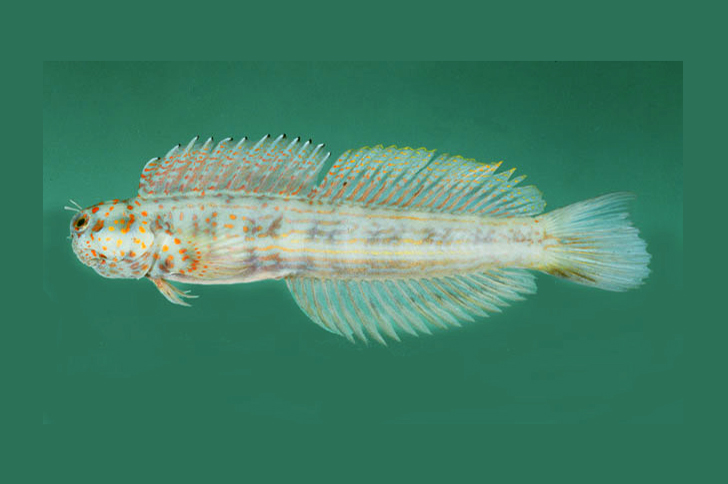- Classification
- ACTINOPTERYGII
- PERCIFORMES
- BLENNIIDAE
- Blenniella
- cyanostigma
Striped Rockskipper, Blenniella cyanostigma (Bleeker 1849)

A Striped Rockskipper, Blenniella cyanostigma, from Alphonse Atoll, Seychelles, January 1993 depth, 1-1.5m. Source: John E. Randall / FishBase. License: CC by Attribution-NonCommercial
Summary:
Males have dusky bands on body, each band with a vertical pair of oblong spots, and a dark spot behind the eye and gill cover. Females have faint dusky bands on the body overlain with dark lines that break up into dashes towards the rear of the body, and dark spots on the median fins.
Cite this page as:
Bray, D.J. 2017, Blenniella cyanostigma in Fishes of Australia, accessed 01 Jul 2025, https://fishesofaustralia.net.au/home/species/4976
Striped Rockskipper, Blenniella cyanostigma (Bleeker 1849)
More Info
|
Distribution |
Recorded from the Australian territory of Christmas Island in the Indian Ocean. Elsewhere the species occurs from east Africa to the western Sumatra, and east to Java and Bali Inhabits tidepools and the inter-tidal zone on coral or rocky reefs. |
|
Features |
Dorsal fin XII-XIV,19-22; Anal fin II, 19-22; Pectoral fin 13-15 (usually 14); Pelvic fin I, 3; Caudal fin procurrent rays 10-14, segmented rays 13; Vertebrae 11-12 + 27-29 = 38-40. Body depth at anal-fin origin 5.6-6.1 in SL; dorsal fin notched between spinous and segmented-ray portions; last pleural rib on 12-13th vertebrae. Orbital cirrus simple filamentous; nasal cirri short and simple to palmate with 2-6 branches; nape without cirri. Lateral line, continuous anterodorsally below dorsal spine 6-7th to 9-10th, disconnected posteroventrally up to below dorsal spine 12-13th. Mandibular pores 4-6. Lips margin entire. Occipital crest present, higher in males. |
|
Species Citation |
Salarias cyanostigma Bleeker 1849, Verhandelingen van het Bataviaasch Genootschap van Kunsten en Wetenschappen 22: 18. Type locality: Pagotang, Java, Indonesia. |
|
Author |
Bray, D.J. 2017 |
|
Resources |
Striped Rockskipper, Blenniella cyanostigma (Bleeker 1849)
References
Allen, G.R. & Steene, R.C. 1988. Fishes of Christmas Island Indian Ocean. Christmas Island : Christmas Island Natural History Association 197 pp. (as Istiblennius andamensis)
Allen, G.R., Steene, R.C. & Orchard, M. 2007. Fishes of Christmas Island. Christmas Island : Christmas Island Natural History Association 2 edn, 284 pp.
Bleeker, P. 1849. Bijdrage tot de kennis der Blennioïden en Gobioïden van der Soenda-Molukschen Archipel, met beschrijving van 42 nieuwe soorten. Verhandelingen van het Bataviaasch Genootschap van Kunsten en Wetenschappen 22: 1-40
Day, F. 1870. On some of the fishes in the Calcutta Museum. Part III. Proceeding of the Scientific Meetings of the Zoological Society of London 1869(3): 611-614 (as Istiblennius andamensis)
Schultz, L.P. & Chapman, W.M. 1960. Subfamily Salarinae. pp. 302-382 in Schultz, L.P., Chapman, W.M., Lachner, E.A. & Woods, L.P. (eds) Fishes of the Marshall and Marianas Islands. Vol. 2. Families Mullidae through Stromateidae. Bulletin of the United States National Museum 202(2): 1-438, figs 91-132, pls 75-123 (as Istiblennius cyanostigma)
Shen, S.-C. , Yang, T.-H. & Lin, J.J. 1986. A review of the blenniid fishes in the waters around Taiwan and its adjacent islands. Taiwan Museum Special Publications Series 5: 1-74.
Springer, V.G. 1986. Family No. 235: Blenniidae. pp. 742-755 in Smith, M.M. & Heemstra, P.C. (eds) Smith's Sea Fishes. Johannesburg : Macmillan South Africa xx + 1047 pp. 144 pls. (as Istiblennius andamensis)
Springer, V.G. & Williams, J.T. 1994. The Indo-west Pacific blenniid fish genus Istiblennius reappraised: a revision of Istiblennius, Blenniella, and Paralticus, new genus. Smithsonian Contributions to Zoology 565: 1-193 figs 1-73
Williams, J.T. 2014. Blenniella cyanostigma. The IUCN Red List of Threatened Species 2014: e.T48342298A48374218. http://dx.doi.org/10.2305/IUCN.UK.2014-3.RLTS.T48342298A48374218.en. Downloaded on 11 April 2017.




